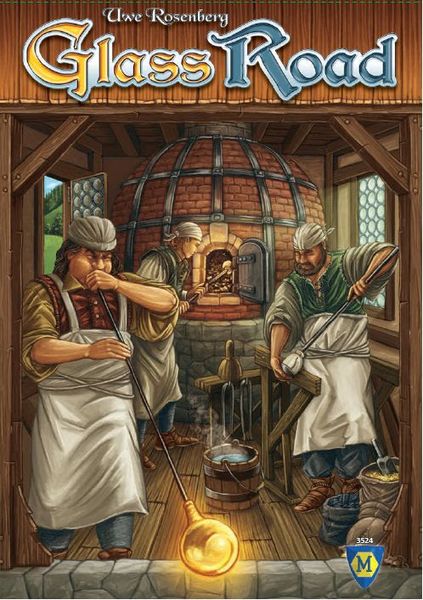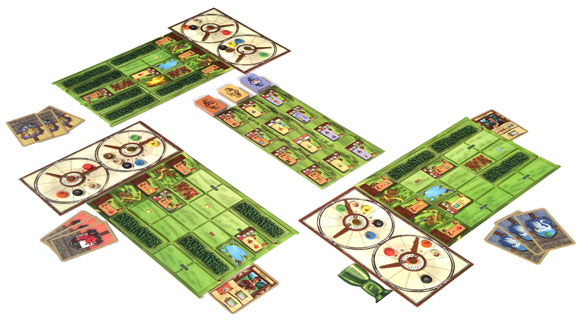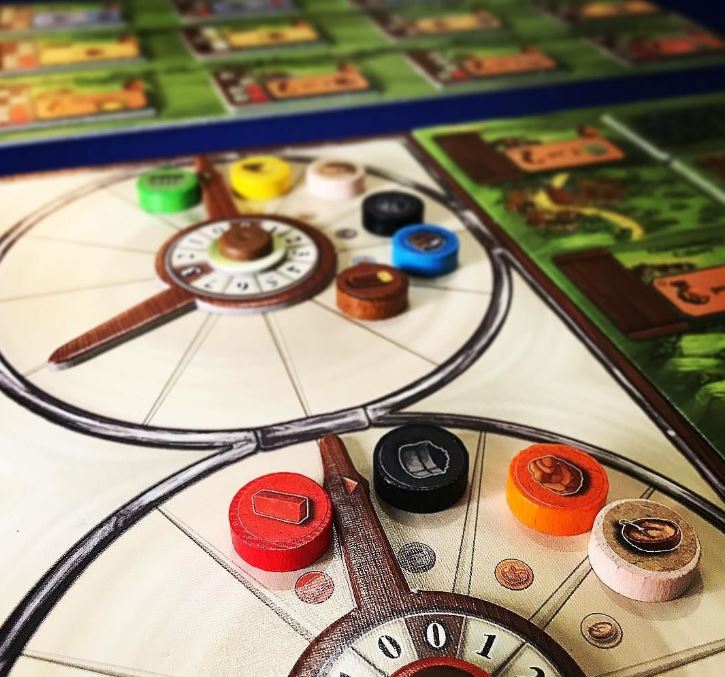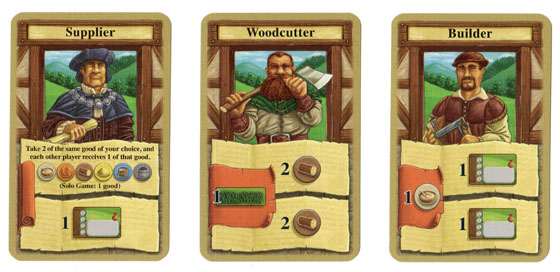Glass Road Review
Uwe Rosenberg is famous for his rather large and meaty Euro game with loads of components and options. This one differs a bit and plays an important role in the designers arsenal of great games.

Posted January 07, 2021 by Jay Kay
- Designer(s): Uwe Rosenberg
- Publisher: A whole bunch of them.
- Playercount: 1-4
- Length: 30 - 45 min
- Age: 8+
INTRO
In Glass Road, players take the roles as glass-makers in the historic Bavarian Forest in Germany, which have more than a 700 year old history of glass making. The game is a medium weight euro that is plauable with 1-4 players. In this review we will give you a fairly detailed overview of the game play, and the Glass Road rule book is also avaible in pdf.
Components
- 60 specialist cards (15 to each player)
- 40 goods tokens (10 to each player)
- 1 building display board
- 4 production rondels
- 4 landscape boards
- 51 landscape tiles (17 each of groves, ponds and sand pits)
- 24 large forrest tiles
- 93 building tiles
- 1 starting player goblet.
- 12 zip-lock bags

Overview
Glass Road is played over the course of four building periods, or seasons of you will. During these the players will gather resources, and produce glass and bricks from these, which in turn will let you build buildings to further your production or score points. Players will also cut down forests to gather the sand buried beneth them, or perhaps make a small pond that will produce food and water. There are a lot of different resources in the game and they are charcoal, clay, food, sand, water, wood, and of course the two resources you are trying to produce with all of the above; glass and bricks. The way you gather resources etc is by selecting 5 of yout 15 specialist cards each season and these obviously do different things, like the water carrier gives you water, wood, and sand, but needs food. Or the slash and burn farmer produces charcoal and food by slashing and burning bits of the forest on your board.
Setup
Setup is pretty straight forward. Each player takes a landscape board and places forests, sand pits, ponds, and groves on their indicated spots. Then they take the 15 specialists cards, a rondel with all the resources indicated on the rondels and puts them on their respective places. Shuffle the building tiles and fill the building display board with the number of face up buildings indicated on the board. Keep the rest of the buildings face down in three different stacks next to the board. Give the starting player the starting player goblet. That's it, you are ready to play.
Gameplay
Glass Road is a fairly simple game, but the rondels and how resources work can be hard to grasp if you are unfamiliar with the concept. When you produce or get resources you will take that/those resources and advance them on your rondel. So far so good. But, as you advance all the resources you need to produce the resource on the other side of the pin of the rondel (glass and bricks), the rondel will rotate clockwise and you are left with 1 resource less of all the production resources and one more of either glass or bricks. It's not as confusing as it sounds. Simply put: when you have enough of the resources to the right, you will automaticly produce resources to the left.

Now when we have that out of the way, let's talk about the game play itself. Each seasons, players will choose 5 of their 15 specialist cards they want to play. Of these, you are guaranteed to be able to play 3. As for the last two, you should select cards that you think your opponents will choose, because when a player plays a specialist, every other player with that card in their hand gets to play it aswell. Each card has two effects, and if you are alone in choosing a particular card, you get both effects, but if not, you only get to choose one. Note that all players choses the card the want to play simultaneously and places them face down in their area, and when all players are ready you reveal them at the same time.

There are three types of buildings; Immediate, Bonus, and Processing.
Immediate gives you a one-time affect when you build it (Example Clay Lake gives you 7 Clay when you build it.), Bonus buildings gives you points, like the Forrester's Office which gives you 1 Point per forest you have at the end of the game.
Last, but not least, the processing buildings gives you special abilities usable any number of times, for the rest of the game. Examples: Sand Pit lets you trade 1 Water for 2 Sand any time you want for the rest of the game. Farmstead lets you remove a pond to convert it into farmland, which gives you 2 Food and 1 Water, any time you want.
Each season you will switch the starting player and after 4 seasons are done, there is nothing else to be done apart from counting the scores and declare a winner. Then play again :)
OPINION
The good
- Fast gameplay, you can play this in 30 minutes, which is rare for a Uwe Rosenberg game.
- Awesome quality of the components.
- Nice artwork.
- The aspect of choosing cards is extremely fun.
The bad
- The rondels might confuse new players and makes the game kind of hard to teach.
- The buildings are a bit "meh".
CONCLUSION
This is the best under-an-hour game by Uwe Rosenberg in our opinion, but it got its flaws. All in all a very nice game though, warmly recomended.
Our rating: A strong 7/10
Check out the Glass Road rules in pdf.
The reprint will hit the stores in the middle of 2021. You can preorder it at Gamenerdz for about 42 dollars.
Return to Board game news